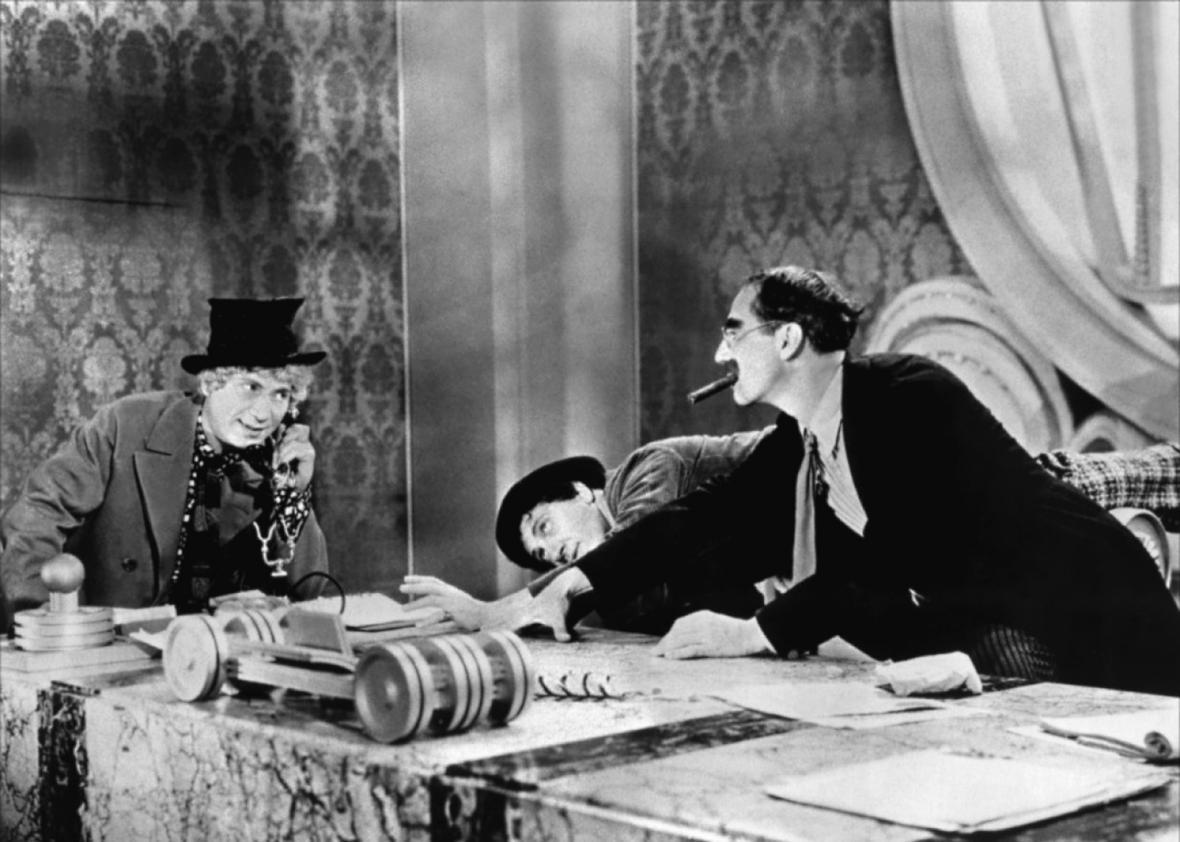Over the course of Donald Trump’s improbable march through the Republican primaries, many writers turned for comparison to A Face in the Crowd, a 1957 film directed by Elia Kazan. It focuses on Larry “Lonesome” Rhodes, a charismatic vagabond, played with devilish enthusiasm by Andy Griffith, who gains exceptional political and cultural influence through the folksy, faux-populist drivel he spouts on his radio and TV programs. It’s a tempting analogue for Trump. But I’d argue that there’s a better pop cultural point of comparison, one that more aptly captures the idea of Trump as a vain strongman whose bluster has scarily escalating stakes: Duck Soup, the madcap Marx Brothers’ classic from 1933 that poked fun at the erratic dictators who were consolidating power in Europe at the time.
Indifferently received when it opened, Duck Soup has since been celebrated as one of Hollywood’s most memorable war films. Like all Marx Brothers’ movies, it is an anarchic farce with a ramshackle plot, absurdist set pieces, and exaggerated characters. The film satirizes thin-skinned leaders with dictatorial tendencies but makes no pretense of being set in the real world. Later in his life, when asked about the larger meaning of Duck Soup, Groucho brushed off the question: “We were just four Jews trying to get a laugh.” (It should be noted that at least one dictator found subversive meaning in the film: Benito Mussolini banned Duck Soup in Italy.) If any lesson is to be drawn from Duck Soup—and it’s always dangerous to look for lessons in Marx Brothers’ films—it’s that giving too much power to, and projecting too much onto, a leader with deep-seated insecurities and a mercurial temperament is a surefire way to destabilize the national order.
The movie takes place in Freedonia, a fictional country mired in a prolonged economic recession. Its only hope of quelling citizen unrest is soliciting $20 million from Mrs. Teasdale, a wealthy widow played with dignified obliviousness by Margaret Dumont. She agrees on one condition: that the country’s current leader step aside for her hand-picked successor, Rufus T. Firefly (Groucho), a wisecracking charlatan with no apparent executive experience.
The inauguration ceremony exposes Firefly’s unfitness for the office. He shows up late; insults the ambassador of Sylvania, an antagonistic neighboring country; and asks his secretary to dictate a letter about an outstanding dental bill but then threatens to fire him for enclosing the payment. When asked how he intends to run the country, Firefly bursts into a raucous song about his nakedly authoritarian policies. He advocates the firing squad for petty offenses, encourages citizens to report all forms of pleasure, and hopes to benefit from corruption. “If you think this country’s bad off now,” he brags, “just wait till I get through with it.” Far from being horrified, the guests appear amused at his unvarnished honesty.
Cabinet meetings in his new administration proceed according to Firefly’s whim. He can’t be bothered with detail-oriented reports and prefers to jot down notes on faulty plumbing than discuss the complexities of the tax code. So contemptuous is Firefly toward his cabinet—made up of distinguished career bureaucrats—that the secretary of War resigns on the spot. Instead of promoting from within, Firefly turns to an unlikely outsider—a curbside peanut vendor (Chico) who also happens to be a spy for the Sylvanian government.
Ultimately, Firefly’s tendency to insult everyone in his sight leads to a diplomatic crisis. Throughout the film, Firefly and Trentino, the Sylvanian ambassador who has plans to undermine the Freedonian government, engage in heated verbal sparring. When Trentino calls him an upstart, Firefly slaps the ambassador across the face with a glove. Trentino threatens war on Freedonia. With Mrs. Teasdale imploring him to mend the rift, Firefly concedes that he lost his temper, but then again strikes Trentino when he jokes with Firefly about their quarrel. As the two countries prepare for war, Trentino agrees to swallow his pride only if Firefly formally apologizes and offers his hand as a symbol of peace. Rather than taking this basic step, Firefly imagines the humiliation he’d suffer if Trentino were to refuse his handshake. Worked up in a paranoid fever, Firefly smacks Trentino with a glove yet again and, with this gesture, thrusts his country into an entirely avoidable war.
In many ways, Firefly’s (and, by extension, Groucho’s) ludicrous personality places him beyond comparison, but Trump might be the exception. Like Firefly, he’s a nonpolitician who is unable to conform to presidential standards of solemnity and competence. Both dismiss the advice of establishment figures, are too distracted with personal grievances to delve into policy details, and have checkered histories of reneging on promised payments. Even their physical characteristics bear some resemblance, with Trump’s preposterous hairdo standing in for Groucho’s equally preposterous greasepaint mustache. They wear their deceptions right on their faces.
But the most obvious overlap between Trump and Firefly comes from their pathological compulsion to belittle any perceived rivals and then refuse to apologize or back down. Whether it’s slapping an ambassador or berating the parents of a fallen soldier, they consistently favor entrenchment over contrition, even when presented with opportunities to right the course. Their outsized, deeply rooted personas render them seemingly incapable of restraining their destructive impulses.
More than 80 years later, Duck Soup retains its transgressive spirit. The film imagines a world where an inexperienced and indecorous leader plunges his country into war partly because of some mild insults he’s unable to move past. It’s reminiscent of a memorable line from Hillary Clinton’s acceptance speech at the DNC: “A man you can bait with a tweet is not a man we can trust with nuclear weapons.” Before this election, Duck Soup resonated in the United States through the ways it lampooned concepts like nationalism and political decorum. Because of Trump’s ascension, however, Rufus T. Firefly no longer seems like an alien political figure. It’s a notion that even Groucho Marx would’ve found absurd.
